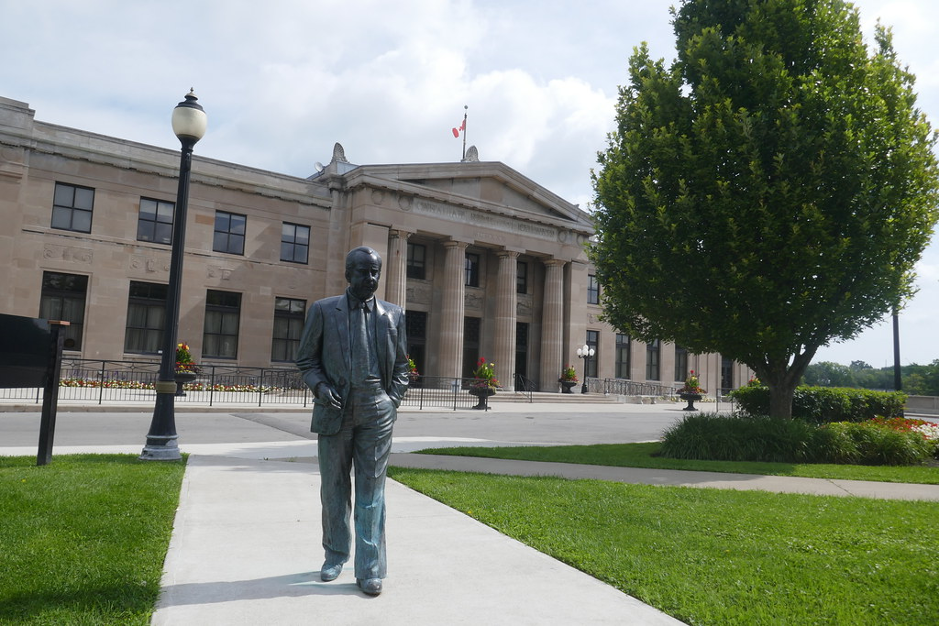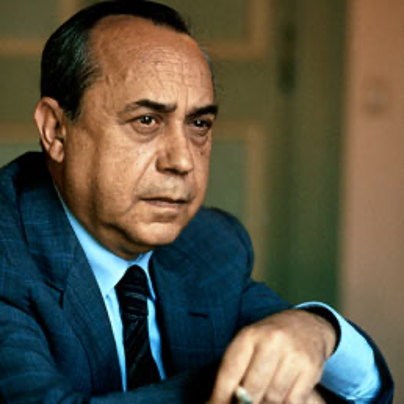Who is Leonardo Sciascia? Why does he have a statue over 6500km away from his hometown in front of Liuna Station? Let’s discover this and more in this month’s historical figure highlight.


Leonardo Sciascia monument and statue in front of Liuna Station which was unveiled in 2017. This was possible due to the strong ties between Hamilton and Racalmuto with the two cities being “twinned” in 1985. There are currently 30,000 people living in Hamilton that can trace their ancestry back to Racalmuto ( whereas there is less than 8000 living in Racalmuto itself). Today, there are many organizations that continue to strengthen such ties from the Sicilian cultural Society of Hamilton lead by Charles Criminisi, Sicilian Canta with Joe Baiardo and Sam Cino and the Racalmutese club with Joe Curto.
Leonardo Sciascia (1921-1989) was an Italian writer, essayist, and politician known for his insightful and critical works that explored the social and political landscape of Sicily. Born and raised in Racalmuto, a small town in Sicily, Sciascia’s writings often delved into themes of corruption, Mafia influence, and the complexities of Sicilian society. His works were characterized by their intellectual depth, attention to detail, and ability to capture the essence of the human condition.
Sciascia’s literary works, including novels such as “Il giorno della civetta” (The Day of the Owl) and “Il contesto” (Equal Danger), shed light on the cultural and political issues plaguing Sicily. He employed a blend of mystery, satire, and social commentary to examine the intricate web of power dynamics, moral ambiguities, and social injustices present in the region. Sciascia’s writing style was characterized by his precise and evocative language, as well as his ability to create multi-dimensional characters who grappled with moral dilemmas and societal pressures.
Beyond his literary contributions, Sciascia was also involved in politics, serving as a member of the Italian Parliament from 1979 until his death. He advocated for justice, civil liberties, and democratic values, actively opposing political corruption and authoritarianism. Sciascia’s influence extended beyond his lifetime, with his works continuing to be celebrated and studied for their profound insights into the human condition and their contribution to the understanding of Sicilian culture and society.


One who seeks to simplify, in search of truth”: this is how Leonardo Sciascia spoke of himself, always managing to convey the complexity of his thoughts in essential phrases. He punctuated his speeches with pauses and silences that betrayed a deep respect for words, often accompanied by the graceful, never vulgar, gesture of a cigarette. Sciascia did not like to talk about himself, and yet his works are scattered with clues that make his portrait clearer. He was a passionate reader, and he drew nourishment for his need for truth from the shelf of fundamental authors: Pirandello, Manzoni, Montaigne, Stendhal, Savinio, Borges.
He never learned to drive, never owned a car, and didn’t even know how to ride a bicycle. However, he loved the train, and from his Sicily, he often embarked on never-ending journeys – even as far as Paris and Stockholm – to enjoy “the pleasure of experiencing the journey, the time and space of travel.”
The doors of his house were always open to welcome colleagues and friends, but he had a sort of phobia when it came to the telephone, and only a few trusted individuals knew his number.
Among his pages, we have selected some passages in which Leonardo Sciascia reveals himself.
«Tutti amiamo il luogo in cui siamo nati, e siamo portati ad esaltarlo. Ma Racalmuto è davvero un paese straordinario. […] Di Racalmuto amo la vita quotidiana, che ha una dimensione un po’ folle. La gente è molto intelligente, tutti sono come personaggi in cerca d’autore».
“We all love the place where we were born, and we are inclined to exalt it. But Racalmuto is truly an extraordinary town. […] What I love about Racalmuto is the everyday life, which has a somewhat mad dimension. The people are very intelligent, everyone is like characters in search of an author.”
«La verità è che il siciliano, nella vita, è un uomo totalmente insicuro. Anch’io lo sono. Quando devo prendere un treno entro in agitazione un giorno prima. E quando arriva l’ora della partenza sono alla stazione con un’ora di anticipo. Chissà: il treno potrebbe anche partire fuori orario».
“The truth is that the Sicilian, in life, is a completely insecure person. I am too. When I have to take a train, I get anxious a day in advance. And when the departure time comes, I am at the station an hour early. Who knows: the train might even depart off schedule.”
Today Sciascia holds a special place in the Sicilian’s heart, especially those from Racalmuto and his sphere of influence is so strong that it even manages to have a statue across the ocean.
Italian version
Leonardo Sciascia (1921-1989) è stato uno scrittore, saggista e politico italiano noto per le sue opere penetranti e critiche che hanno esplorato il panorama sociale e politico della Sicilia. Nato e cresciuto a Racalmuto, un piccolo paese della Sicilia, gli scritti di Sciascia hanno spesso approfondito temi di corruzione, influenza mafiosa e complessità della società siciliana. Le sue opere erano caratterizzate dalla loro profondità intellettuale, attenzione ai dettagli e capacità di catturare l’essenza della condizione umana.
Le opere letterarie di Sciascia, tra cui romanzi come “Il giorno della civetta” e “Il contesto ” fanno luce sulle questioni culturali e politiche che affliggono la Sicilia. Ha impiegato una miscela di mistero, satira e commento sociale per esaminare l’intricata rete di dinamiche di potere, ambiguità morali e ingiustizie sociali presenti nella regione. Lo stile di scrittura di Sciascia era caratterizzato dal suo linguaggio preciso ed evocativo, così come dalla sua capacità di creare personaggi multidimensionali alle prese con dilemmi morali e pressioni sociali.
Oltre ai suoi contributi letterari, Sciascia è stato anche coinvolto in politica, prestando servizio come membro del Parlamento italiano dal 1979 fino alla sua morte. Ha sostenuto la giustizia, le libertà civili e i valori democratici, opponendosi attivamente alla corruzione politica e all’autoritarismo. L’influenza di Sciascia si è estesa oltre la sua vita, con le sue opere che continuano ad essere celebrate e studiate per le loro profonde intuizioni sulla condizione umana e il loro contributo alla comprensione della cultura e della società siciliane.
“Uno che cerca di semplificare, alla ricerca della verità”: così parlava di sé Leonardo Sciascia, riuscendo sempre a trasmettere la complessità dei suoi pensieri in frasi essenziali. Punteggiava i suoi discorsi con pause e silenzi che tradivano un profondo rispetto per le parole, spesso accompagnate dal gesto garbato, mai volgare, di una sigaretta. Sciascia non amava parlare di sé, eppure le sue opere sono disseminate di indizi che rendono più nitido il suo ritratto. Era un lettore appassionato, e traeva nutrimento per il suo bisogno di verità dallo scaffale di autori fondamentali: Pirandello, Manzoni, Montaigne, Stendhal, Savinio, Borges.
Non ha mai imparato a guidare, non ha mai posseduto un’auto e non sapeva nemmeno andare in bicicletta. Amava però il treno, e dalla sua Sicilia si imbarcava spesso in interminabili viaggi – anche fino a Parigi e Stoccolma – per assaporare “il piacere di vivere il viaggio, il tempo e lo spazio del viaggio”.
Le porte di casa sua erano sempre aperte per accogliere colleghi e amici, ma aveva una sorta di fobia quando si trattava di telefono, e solo poche persone fidate conoscevano il suo numero.
Oggi Sciascia occupa un posto speciale nel cuore dei siciliani, soprattutto di quelli di Racalmuto, e la sua sfera di influenza è così forte che riesce persino ad avere una statua al di là dell’oceano.
Sign up to our mailing list to be the first to get notifications of contests, events and news.